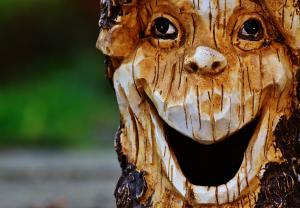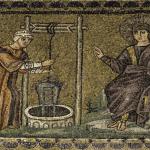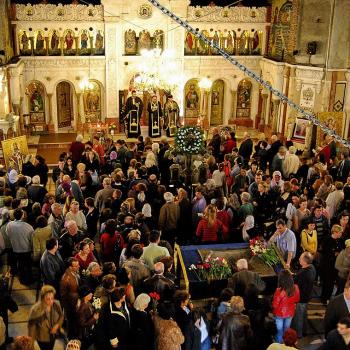
There is a rather humorous story written about Abba Pambo in the Sayings of the Desert Fathers. In it, we are told of a group of demons wanting to distract him from his spiritual discipline by making him laugh:
They said of Abba Pambo that his face never smiled. So one day, wishing to make him laugh, the demons stuck wing feathers on to a lump of wood and brought it in making an uproar and saying, ‘Go, go.’ When he saw them Abba Pambo began to laugh and the demons started to say in chorus, ‘Ha! ha! Pambo has laughed!” But in reply he said to them, ‘I have not laughed, but I made fun of your powerlessness, because it takes so many of you to carry a wing.’[1]
It is hard not to laugh when reading the story. The demons wanted to make Pambo laugh, and indeed, they got what they wanted but it did not lead to what they desired from it. They wanted him to laugh, thinking it would make him forget his spiritual practice, as he would be caught up with the laughter instead of his pursuit for God. They did this by acting foolish, coming together to move some feathers attached to a lump of wood. It is easy to imagine the kind of comic buffoonery which would have been involved in their undertaking, and how many people, upon seeing it, would have laughed. And yes, Pambo laughed, but his laughter was not the kind which they wanted. It was a laugh which emerged from his spiritual discipline. Instead of being distracted by their slapstick comedy routine, all they did was prove to him how foolish and weak they were. They led him to realize how foolish and weak evil truly is.
Pambo laughed at the power of evil itself. He saw, through their actions, how evil has no power of its own. Even at its most serious, there is always something funny about evil, because it always contradicts itself. In order to act, in order to do anything, evil must grasp after and use some element of the good. It is nothing by itself. When we realize its inherent weakness, in that nothing it holds to and grasps truly belongs to it, but is rather borrowed or stolen from some good, we should be able to perceive the true powerlessness of evil. We should, like Pambo, be able to laugh at it. It truly is funny, not because there is nothing serious involved, but because in and through all that seriousness, evil can never truly be itself but must always use and abuse something other than itself to get things done.
Evil is weak. Evil is inefficient. Evil is foolish. And when we see this, when we see through all the illusions evil uses to appear powerful, the best way to overcome it is to laugh, not with it and all its attempts to disturb us, but at it, at its inherent weakness. The more we laugh at evil, in and through our spiritual connection with God, the less power it will have over us. The more we laugh at it, the less it will be able to overcome us or influence us in our lives. Evil wants us to believe it is more powerful than it is, but in reality, the darkness will never overtake the light. Mock the devil, and he will flee.
Thus, when Pambo laughed, the demons got what they wanted, or so they thought. They thought they had won. They thought that they had disturbed him and his spiritual practice. But Pambo was not distracted. He continued to center himself on God, and it was through his union with God he was able to see the demons for what they were. By trying to make themselves look strong and powerful, they revealed themselves to be weak. They had to come together en masse in order to move a small piece of wood attached to a feather. It is something which we can easily do without thinking about it. Why should we be afraid of them?
When we are confronted with the powers of darkness, while we should take what they want seriously, because it can cause us and others problems, we should still have room to laugh at them. Such laughter takes away much of their power. The control and authority they pretends to have is all but an illusion, and nothing dispels that illusion more than laugher. Thus, though we can easily become distracted by laughter, and so many spiritual men and women avoid it so as to avoid such distraction, appearing humorless as a result, laughter can have a place in the spiritual life and used for much good. The Preacher in Ecclesiastes, understanding this, told us there is a time and place for everything, and so there is a time and place for us to laugh:
For everything there is a season, and a time for every matter under heaven: a time to be born, and a time to die; a time to plant, and a time to pluck up what is planted; a time to kill, and a time to heal; a time to break down, and a time to build up; a time to weep, and a time to laugh; a time to mourn, and a time to dance; a time to cast away stones, and a time to gather stones together; a time to embrace, and a time to refrain from embracing; a time to seek, and a time to lose; a time to keep, and a time to cast away; a time to rend, and a time to sew; a time to keep silence, and a time to speak; a time to love, and a time to hate; a time for war, and a time for peace (Eccl. 3:1-8 RSV).
Laughter has a place even in the spiritual life, and so is a good, as Pambo shows us, but of course, it can be abused, used to lead us astray. This is what evil tries to do, take some good and have it become disordered so that when we use it, we use it in a deficient form. Thus, the demons tried to get Pambo to laugh in order to turn his attention away from God. They wanted him caught up in the pleasure of laughter. He would have none of it. He saw through the demons and what they wanted from him. And he laughed. He laughed at the demons and their weakness, at the way they could not even properly come together to lift up a feather. He laughed a spiritual laugh which helped him become even more centered upon God. It should not be surprising that there is room for such a spiritual laugh, for, when we read and study Scripture, we find that such laughter, such joy, is promised to all of us: “Blessed are you that weep now, for you shall laugh” (Lk. 6:21b RSV). Thus, when we are united with God, we will truly laugh a holy laugh, and through it find ourselves overcoming all the evil, pain and sorrows we have experienced in our lives.
[1] The Sayings of the Desert Fathers. trans. Benedicta Ward (Kalamazoo, MI: Cistercian Publications, 1984), 197-8 [Saying Abba Pambo 13].
Stay in touch! Like A Little Bit of Nothing on Facebook.
If you liked what you read, please consider sharing it with your friends and family!












